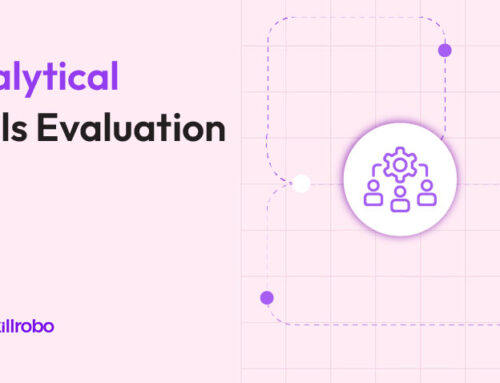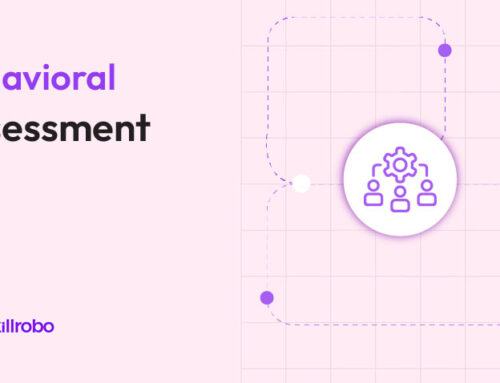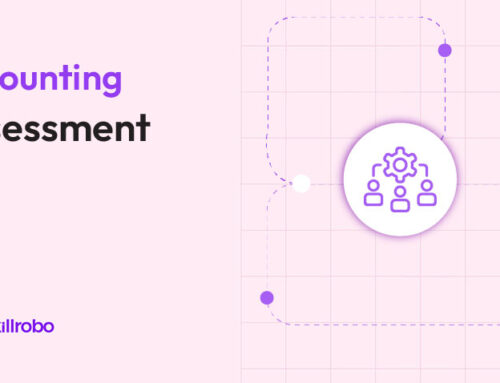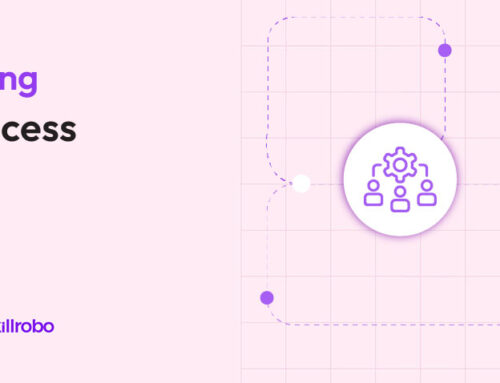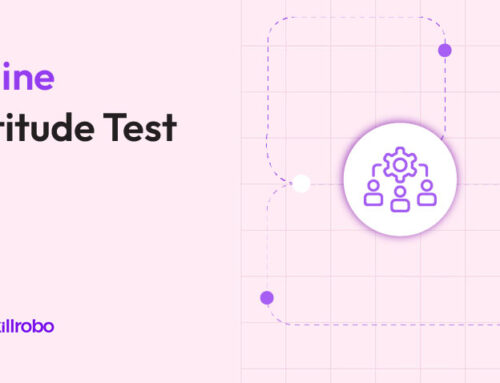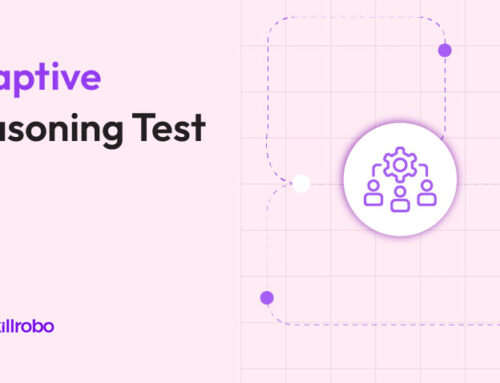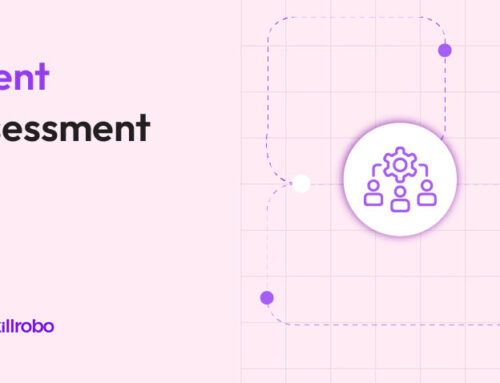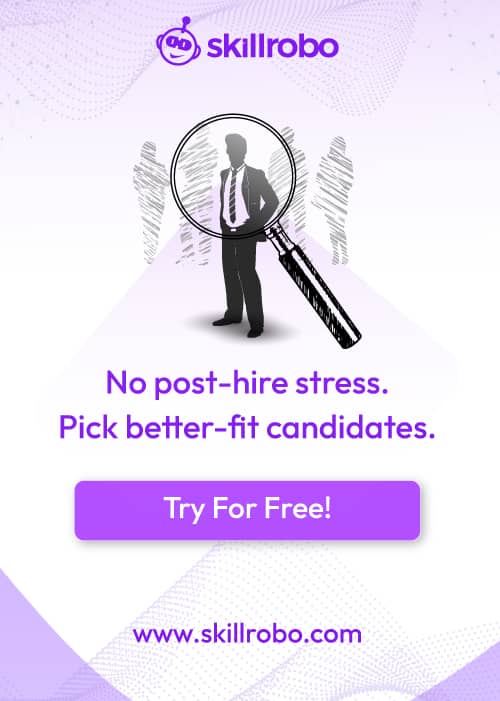Table of Contents
Related articles

The role of an HR professional extends far beyond merely filling vacancies. It involves strategically identifying and onboarding individuals capable of driving sustained organizational growth. Cognitive assessments, often underutilized, can significantly enhance the effectiveness of your recruitment processes by predicting future job performance accurately.
This guide delves deeply into cognitive assessments, explaining their significance, application, and practical strategies for integrating them effectively into your hiring process.
What Exactly is Cognitive Ability?
Cognitive ability refers to an individual’s mental capacity for reasoning, problem-solving, decision-making, and adapting to new situations. These abilities reflect how well candidates can process information, handle complexity, and apply knowledge in practical scenarios. Cognitive skills broadly encompass:
-
Logical Reasoning: The capability to analyze problems systematically.
-
Numerical Ability: Comfort and skill with numerical information.
-
Verbal Comprehension: The capacity to understand and communicate effectively.
-
Abstract Thinking: Recognizing patterns and drawing logical conclusions from abstract concepts.
As an HR decision-maker, clearly understanding these dimensions allows you to match candidate abilities with specific job requirements efficiently.
The Role of Cognitive Assessments in Modern Hiring
Cognitive assessments, commonly referred to as aptitude or cognitive ability tests, are structured evaluations designed to gauge these mental skills in prospective employees. By administering such tests, HR teams gain an objective snapshot of a candidate’s potential performance, beyond just interviews or resumes.
These assessments typically involve scenarios testing problem-solving, numerical reasoning, and critical thinking within time constraints. Incorporating cognitive assessments helps predict job success more reliably compared to traditional hiring methods alone.
Benefits of Cognitive Assessments for Organizations
1. High Predictive Accuracy
Cognitive tests have been scientifically validated as some of the most reliable indicators of job performance. Candidates scoring highly often show greater productivity, adaptability, and long-term potential. By utilizing these assessments, organizations can confidently predict performance and future success.
2. Versatility Across Roles and Departments
Cognitive ability assessments measure general intelligence rather than specific technical skills, making them broadly applicable across multiple job categories—from entry-level roles to senior management positions. This versatility streamlines your recruitment process, enabling the HR team to maintain consistency and fairness.
3. Reduced Hiring Costs and Improved ROI
Implementing cognitive assessments can significantly lower recruitment costs by reducing turnover rates and enhancing candidate quality. The improved accuracy in candidate selection means fewer performance issues, better retention, and ultimately, a higher return on investment in recruitment processes.
4. Fairness and Objectivity
Subjective biases can inadvertently creep into interviews and traditional evaluations. Cognitive assessments introduce an objective measure, ensuring fairness by focusing purely on candidates’ capabilities, independent of interview dynamics or unconscious biases.
Real-World Impact and Case Studies
Companies across industries regularly utilize cognitive assessments to refine their hiring strategies. A global technology firm recently reported a 30% improvement in new hire productivity after integrating cognitive assessments into their recruitment process. Similarly, a financial services provider noted a dramatic reduction in turnover rates, attributing this success directly to more informed hiring decisions backed by cognitive assessments.
By learning from these examples, HR professionals can effectively communicate the business value of cognitive assessments to stakeholders within their organizations.
Considerations When Using Cognitive Assessments
While the advantages of cognitive tests are significant, recognizing their limitations and addressing them proactively ensures a balanced and ethical approach.
1. Cognitive Ability Isn’t Everything
It’s important to acknowledge that cognitive tests measure one dimension of a candidate’s potential. Attributes such as interpersonal skills, emotional intelligence, work ethics, and specific technical competencies must also factor into a holistic assessment. Combining cognitive tests with other assessment methods helps address these limitations comprehensively.
2. Potential Bias and Adverse Impact
Improperly designed cognitive tests may unintentionally disadvantage certain groups. Regularly reviewing and selecting validated, unbiased assessments ensures compliance with diversity and inclusion goals. Collaborating with reputable employment assessment tools that adhere to ethical standards further mitigates this risk.
3. Handling Test Anxiety and Candidate Experience
The pressure of formal testing environments can negatively impact some candidates’ performances. HR teams must ensure that the testing environment is supportive and clearly communicated, helping candidates perform authentically and reducing stress-induced inaccuracies.
Best Practices for Implementing Cognitive Assessments
Integrating cognitive assessments effectively requires strategic planning. Here are detailed best practices to maximize their effectiveness:
Combine Cognitive Tests with Other Methods
Implement cognitive assessments alongside structured interviews, personality tests, and practical skill evaluations. Such a comprehensive approach helps HR teams create a multi-dimensional candidate profile, significantly improving hiring decisions. For instance, combine a cognitive assessment for logical reasoning with role-play scenarios during interviews to evaluate interpersonal and problem-solving skills simultaneously.
Ensure Validity and Reliability
Always select assessments backed by rigorous scientific research. Valid and reliable cognitive tests consistently predict job performance and help you avoid costly hiring mistakes. Regularly audit your assessment tools to confirm their relevance to evolving job roles and organizational needs.
Customize Assessments to Specific Roles
Not every cognitive skill carries equal importance across roles. Customize the assessment criteria to align closely with role-specific cognitive demands. For example, numerical reasoning might be crucial for finance roles, while abstract thinking and creativity are paramount in marketing positions.
Maintain Fairness and Compliance
Consistently evaluate your cognitive assessment strategy to ensure compliance with employment laws and fairness guidelines. Regular training for HR professionals in test administration and interpretation promotes ethical recruitment practices, protecting both your candidates and your organization.
Overcoming Common Implementation Challenges
Implementing new assessment processes may encounter resistance internally or operational hurdles. Here’s how to manage these effectively:
-
Educate Internal Stakeholders:
Clearly communicate the rationale behind cognitive assessments, emphasizing their proven business impact to ensure executive and managerial buy-in. -
Pilot Programs:
Launch cognitive assessments initially on a smaller scale. Measure outcomes, refine the process, and progressively scale up to the entire organization based on successful results. -
Transparent Communication with Candidates:
Clearly inform candidates about the purpose of assessments, the process involved, and the ways results are utilized in decision-making. Transparency enhances candidate experience and acceptance.
FAQs for HR Professionals
-
How long do cognitive assessments typically take?
Most cognitive tests take between 15 to 45 minutes, providing sufficient insight without excessive time commitments for candidates or HR teams. -
Can candidates practice or prepare for these assessments?
Yes, providing practice resources or clear guidelines on the types of questions candidates can expect helps reduce anxiety and allows genuine capability assessment. -
Are cognitive assessments suitable for executive-level roles?
Absolutely. Cognitive assessments are particularly valuable at executive levels where strategic thinking, problem-solving, and decision-making significantly impact organizational success. -
Do these assessments require specialized software?
Typically, yes. Many reputable vendors offer user-friendly, online platforms integrated into applicant tracking systems, streamlining administration and evaluation.
Conclusion: Leveraging Cognitive Assessments for Strategic Advantage
Incorporating cognitive assessment tools like Skillrobo into your hiring strategy equips HR professionals with powerful tools to enhance decision-making accuracy, fairness, and business outcomes. By clearly understanding their value, overcoming implementation challenges, and adopting best practices, organizations can significantly improve the quality and productivity of their workforce.
Ultimately, cognitive assessments not only help identify talented individuals but also empower your organization to build teams capable of driving sustained innovation, growth, and competitive advantage in a rapidly evolving market landscape.
Adopting these assessments isn’t just a tactical HR decision—it’s a strategic investment in your organization’s future success.

The role of an HR professional extends far beyond merely filling vacancies. It involves strategically identifying and onboarding individuals capable of driving sustained organizational growth. Cognitive assessments, often underutilized, can significantly enhance the effectiveness of your recruitment processes by predicting future job performance accurately.
This guide delves deeply into cognitive assessments, explaining their significance, application, and practical strategies for integrating them effectively into your hiring process.
What Exactly is Cognitive Ability?
Cognitive ability refers to an individual’s mental capacity for reasoning, problem-solving, decision-making, and adapting to new situations. These abilities reflect how well candidates can process information, handle complexity, and apply knowledge in practical scenarios. Cognitive skills broadly encompass:
-
Logical Reasoning: The capability to analyze problems systematically.
-
Numerical Ability: Comfort and skill with numerical information.
-
Verbal Comprehension: The capacity to understand and communicate effectively.
-
Abstract Thinking: Recognizing patterns and drawing logical conclusions from abstract concepts.
As an HR decision-maker, clearly understanding these dimensions allows you to match candidate abilities with specific job requirements efficiently.
The Role of Cognitive Assessments in Modern Hiring
Cognitive assessments, commonly referred to as aptitude or cognitive ability tests, are structured evaluations designed to gauge these mental skills in prospective employees. By administering such tests, HR teams gain an objective snapshot of a candidate’s potential performance, beyond just interviews or resumes.
These assessments typically involve scenarios testing problem-solving, numerical reasoning, and critical thinking within time constraints. Incorporating cognitive assessments helps predict job success more reliably compared to traditional hiring methods alone.
Benefits of Cognitive Assessments for Organizations
1. High Predictive Accuracy
Cognitive tests have been scientifically validated as some of the most reliable indicators of job performance. Candidates scoring highly often show greater productivity, adaptability, and long-term potential. By utilizing these assessments, organizations can confidently predict performance and future success.
2. Versatility Across Roles and Departments
Cognitive ability assessments measure general intelligence rather than specific technical skills, making them broadly applicable across multiple job categories—from entry-level roles to senior management positions. This versatility streamlines your recruitment process, enabling the HR team to maintain consistency and fairness.
3. Reduced Hiring Costs and Improved ROI
Implementing cognitive assessments can significantly lower recruitment costs by reducing turnover rates and enhancing candidate quality. The improved accuracy in candidate selection means fewer performance issues, better retention, and ultimately, a higher return on investment in recruitment processes.
4. Fairness and Objectivity
Subjective biases can inadvertently creep into interviews and traditional evaluations. Cognitive assessments introduce an objective measure, ensuring fairness by focusing purely on candidates’ capabilities, independent of interview dynamics or unconscious biases.
Real-World Impact and Case Studies
Companies across industries regularly utilize cognitive assessments to refine their hiring strategies. A global technology firm recently reported a 30% improvement in new hire productivity after integrating cognitive assessments into their recruitment process. Similarly, a financial services provider noted a dramatic reduction in turnover rates, attributing this success directly to more informed hiring decisions backed by cognitive assessments.
By learning from these examples, HR professionals can effectively communicate the business value of cognitive assessments to stakeholders within their organizations.
Considerations When Using Cognitive Assessments
While the advantages of cognitive tests are significant, recognizing their limitations and addressing them proactively ensures a balanced and ethical approach.
1. Cognitive Ability Isn’t Everything
It’s important to acknowledge that cognitive tests measure one dimension of a candidate’s potential. Attributes such as interpersonal skills, emotional intelligence, work ethics, and specific technical competencies must also factor into a holistic assessment. Combining cognitive tests with other assessment methods helps address these limitations comprehensively.
2. Potential Bias and Adverse Impact
Improperly designed cognitive tests may unintentionally disadvantage certain groups. Regularly reviewing and selecting validated, unbiased assessments ensures compliance with diversity and inclusion goals. Collaborating with reputable employment assessment tools that adhere to ethical standards further mitigates this risk.
3. Handling Test Anxiety and Candidate Experience
The pressure of formal testing environments can negatively impact some candidates’ performances. HR teams must ensure that the testing environment is supportive and clearly communicated, helping candidates perform authentically and reducing stress-induced inaccuracies.
Best Practices for Implementing Cognitive Assessments
Integrating cognitive assessments effectively requires strategic planning. Here are detailed best practices to maximize their effectiveness:
Combine Cognitive Tests with Other Methods
Implement cognitive assessments alongside structured interviews, personality tests, and practical skill evaluations. Such a comprehensive approach helps HR teams create a multi-dimensional candidate profile, significantly improving hiring decisions. For instance, combine a cognitive assessment for logical reasoning with role-play scenarios during interviews to evaluate interpersonal and problem-solving skills simultaneously.
Ensure Validity and Reliability
Always select assessments backed by rigorous scientific research. Valid and reliable cognitive tests consistently predict job performance and help you avoid costly hiring mistakes. Regularly audit your assessment tools to confirm their relevance to evolving job roles and organizational needs.
Customize Assessments to Specific Roles
Not every cognitive skill carries equal importance across roles. Customize the assessment criteria to align closely with role-specific cognitive demands. For example, numerical reasoning might be crucial for finance roles, while abstract thinking and creativity are paramount in marketing positions.
Maintain Fairness and Compliance
Consistently evaluate your cognitive assessment strategy to ensure compliance with employment laws and fairness guidelines. Regular training for HR professionals in test administration and interpretation promotes ethical recruitment practices, protecting both your candidates and your organization.
Overcoming Common Implementation Challenges
Implementing new assessment processes may encounter resistance internally or operational hurdles. Here’s how to manage these effectively:
-
Educate Internal Stakeholders:
Clearly communicate the rationale behind cognitive assessments, emphasizing their proven business impact to ensure executive and managerial buy-in. -
Pilot Programs:
Launch cognitive assessments initially on a smaller scale. Measure outcomes, refine the process, and progressively scale up to the entire organization based on successful results. -
Transparent Communication with Candidates:
Clearly inform candidates about the purpose of assessments, the process involved, and the ways results are utilized in decision-making. Transparency enhances candidate experience and acceptance.
FAQs for HR Professionals
-
How long do cognitive assessments typically take?
Most cognitive tests take between 15 to 45 minutes, providing sufficient insight without excessive time commitments for candidates or HR teams. -
Can candidates practice or prepare for these assessments?
Yes, providing practice resources or clear guidelines on the types of questions candidates can expect helps reduce anxiety and allows genuine capability assessment. -
Are cognitive assessments suitable for executive-level roles?
Absolutely. Cognitive assessments are particularly valuable at executive levels where strategic thinking, problem-solving, and decision-making significantly impact organizational success. -
Do these assessments require specialized software?
Typically, yes. Many reputable vendors offer user-friendly, online platforms integrated into applicant tracking systems, streamlining administration and evaluation.
Conclusion: Leveraging Cognitive Assessments for Strategic Advantage
Incorporating cognitive assessment tools like Skillrobo into your hiring strategy equips HR professionals with powerful tools to enhance decision-making accuracy, fairness, and business outcomes. By clearly understanding their value, overcoming implementation challenges, and adopting best practices, organizations can significantly improve the quality and productivity of their workforce.
Ultimately, cognitive assessments not only help identify talented individuals but also empower your organization to build teams capable of driving sustained innovation, growth, and competitive advantage in a rapidly evolving market landscape.
Adopting these assessments isn’t just a tactical HR decision—it’s a strategic investment in your organization’s future success.



